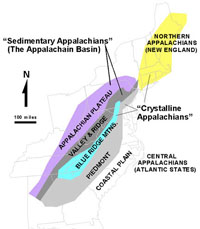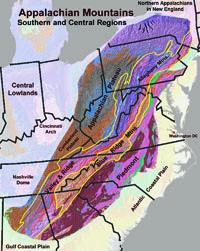
Regional Geology of North America |
Appalachian Mountains Provinces |
Click on images for a |
| The Appalachian Mountains encompass a vast region along the eastern United States extending from Alabama and Georgia (to the south) to New England and eastern Canada (to the north). The Appalachian Mountains are an ancient range of mountains that formed as North America collided with Africa, Europe, and other smaller landmass that eventually assembled to form the supercontinent of Pangaea in Late Paleozoic time. The Appalachian Mountains may have rivaled the modern Himalayan Mountains in their size and extent at the peak of their orogenic formation in the Late Paleozoic Era. Today, the region is still very mountainous and hosts deeply eroded plateau regions. The region is subdivided into 5 physiographic Provinces (Figures 21 and 22): * Piedmont Province * Blue Ridge Mountains Province *Valley and Ridge Province *Appalachian Plateaus Province * Northern Appalachians Province (or New England Province). Each of these physiographic provinces are discussed separately. |
 |
 |
| Fig. 21. Map showing the physiographic provinces of the Appalachian Mountains region. | Fig. 22. General geologic map of the southern and central Appalachian Mountains region. |
| https://gotbooks.miracosta.edu/geology/regions/appalachians.html 1/20/2017 |